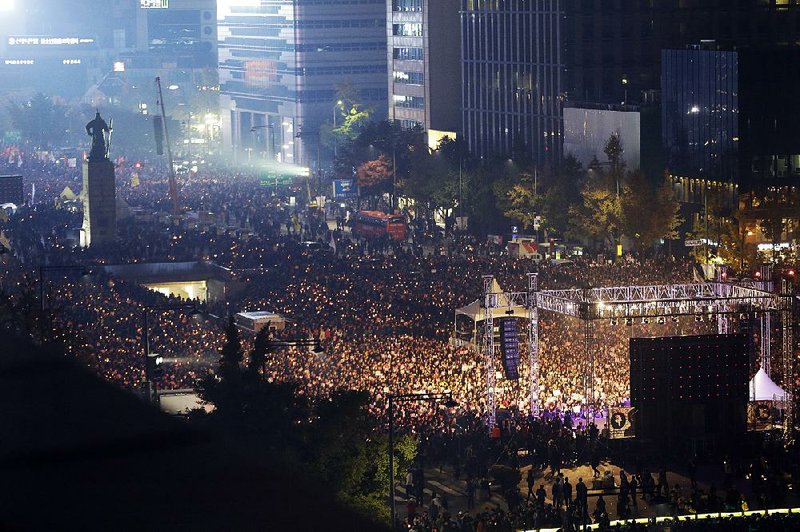SEOUL, South Korea -- Tens of thousands of South Koreans poured into the streets of downtown Seoul on Saturday, using words including "treason" and "criminal" to demand that President Park Geun-hye step down.
The protest, the largest anti-government demonstration in the capital in nearly a year, came a day after Park apologized on live television in response to accusations that she allowed a mysterious confidante to manipulate power from the shadows.
Holding banners, candles and colorful signs that read "Park Geun-hye out" and "Treason by a secret government," a sea of demonstrators filled a square in front of an old palace gate and the nearby streets, singing and applauding speeches calling for the ouster of the president.
They then shifted into a slow march in streets around City Hall, shouting "Arrest Park Geun-hye," "Step down, criminal" and "We can't take this any longer," before moving back to the square and cheering on more speeches that continued into the night.
"Park should squarely face the prosecution's investigation and step down herself. If she doesn't, politicians should move to impeach her," said Kim Seo-yeon, one of the many college students who participated in the protest.
"She absolutely lost all authority as president over the past few weeks," he said.
Earlier in the week, prosecutors arrested Choi Soon-sil, the daughter of late cult leader Choi Tae-min and a longtime friend of Park, and detained two former presidential aides over allegations that they pressured businesses into giving $70 million to two foundations Choi Soon-sil controlled.
There are also allegations that Choi, despite having no government job, regularly received classified information and meddled in various state affairs, including the appointment of ministers and policy decisions.
"I came out today because this is not the country I want to pass on to my children," said another demonstrator, Choi Kyung-ha, a mother of three. "My kids have asked me who Choi Soon-sil was and whether she's the real president, and I couldn't provide an answer."
Park has admitted letting Choi Soon-sil, who has no government job or background in policy, edit some of her speeches. News reports have alleged that Choi had considerable sway in the presidential Blue House and other government agencies.
But what infuriates many South Koreans is not merely that Park had a secret adviser, or even the possibility that the adviser turned a profit from the relationship. It is the notion that their president has been in thrall for decades to a family of charlatans.
There is no evidence that Choi has continued the religious practices of her father, or that Park, who befriended both Chois in the 1970s, was ever his spiritual follower. Still, in protest rallies, on social media and even in newspaper editorials, Park is depicted as a puppet, manipulated while a young woman by Choi Tae-min and while president by his daughter.
After a cable news channel discovered that Choi Soon-sil had advised Park on what color to wear during an overseas trip, some suggested that she had based her choices on an astrological system. Others have raised the possibility that Choi inserted mystic symbolism into decorations at Park's inauguration ceremony in 2013.
Choi Tae-poong, a 57-year-old retiree, said he came out to protest because he thought the situation had reached a point where "no more patience is allowed."
"I cannot bear this anymore," he said.
Park has tried to restore confidence by firing eight aides and nominating three new top Cabinet officials, including the prime minister, but opposition parties have described her personnel reshuffles as a diversionary tactic.
One national poll released Friday had Park's approval rating at 5 percent, the lowest for any president in South Korea since the country achieved democracy in the late 1980s after decades of military dictatorship.
In Friday's televised apology, Park commented on the corruption allegations surrounding Choi and her former aides and vowed to accept a direct investigation into her actions, but avoided the more damning allegation that Choi perhaps had interfered with important government decisions on policy and personnel.
Park has 15 months left in her term. If she resigns before the end of it, South Korean laws require the country to hold an election to pick a new president within 60 days.
But Park has vowed to make whatever changes are needed to serve out her term.
"From now on," Park said Friday, "I will completely cut off any private relationships in my life."
Information for this article was contributed by Kim Tong-hyung of The Associated Press; and by Choe Sang-hun of The New York Times.
A Section on 11/06/2016
